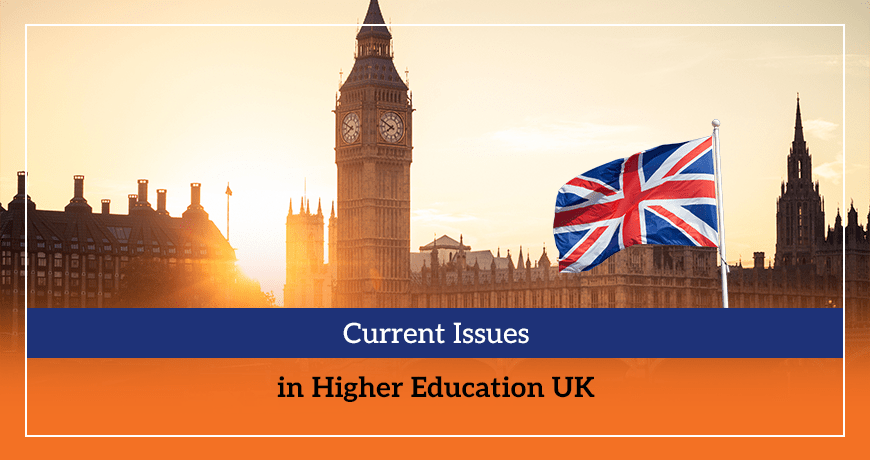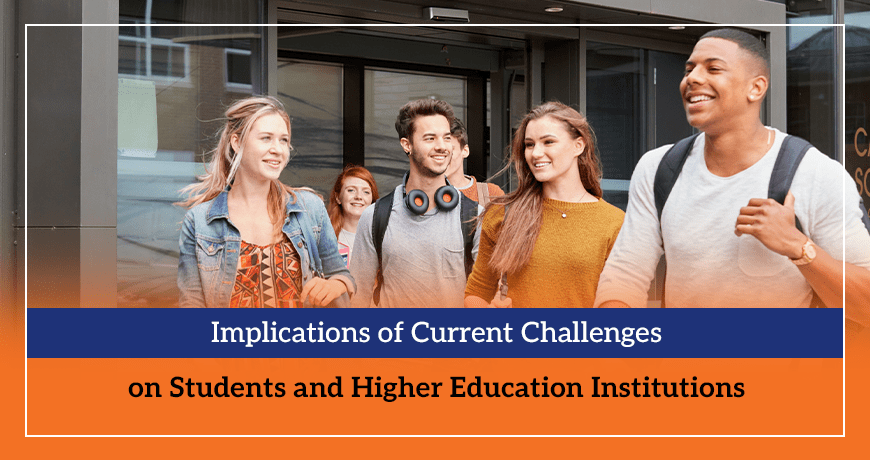

Dr Mohammad Shafiq
The current landscape of higher education in the United Kingdom is not smooth. Many universities are having a hard time. The Importance of addressing current issues in higher education is huge. If we don't fix things now, it will affect students' higher education future. Today, we will discuss the current challenges facing higher education UK.
The evolution of the higher education sector in the UK has a long and interesting story. Back in the old days, only a few selected people could go to university. But over time, things started to change. Higher education in the UK went through a big transformation. More universities were built, and more people got the chance to study.
But it wasn't always easy. Higher education institutions had to face a lot of challenges along the way. They had to figure out how to make education accessible to everyone and maintain high teaching and research standards.
Despite these challenges, UK higher education institutions managed to overcome them. They adapted and improved, making education better for everyone.

The higher education landscape in the UK is struggling with several challenges shaping the future of universities and colleges. Some notable current issues are described below.
Tuition Fee Increases: UK universities have seen a consistent rise in tuition fees, particularly for international students. It is one of the biggest challenges facing higher education. This increase adds a significant financial burden, especially compared to competitor nations like Germany and France.
The Brexit Effect: Brexit introduced visa complexities and increased the perceived difficulty of studying in the UK for international students. This resulted in a significant drop in applications from the continent.
The Current State of Government Funding: Despite recent reductions, government funding remains universities' primary source of income. They constitute around 40% of their total revenue. Government funding has seen a decline in recent years. This puts pressure on universities and raises concerns about sustainability and affordability for students.
Challenges with Private Sector Involvement: Universities increased their alternative funding sources, including philanthropic donations, corporate partnerships, etc. However, it become one of the challenges in higher education.
Critics argue that private involvement can lead to variances of interest, education commercialization, and the spread of imbalances.
COVID-19 Impact: The COVID-19 impact has accelerated the urgency of this transition, forcing universities to swiftly transfer to online teaching and learning in response to lockdowns and social distancing measures. Overnight, traditional classroom-based instruction gave way to virtual lectures, online tutorials, and remote assessments. This caused logistical and educational challenges for both educators and students.
Implementing E-Learning Strategies: Implementing E-Learning Strategies presents its own set of obstacles. Universities must navigate issues such as the limitations of digital facilities, access to technology and internet connectivity, and the digital skills gap among faculty and students. Besides, there are concerns about maintaining the quality of education and ensuring equitable access to learning resources in an online environment.
Teaching Quality Metrics: One of the pressing challenges facing universities is adapting to changes in teaching quality metrics. Teaching quality has been estimated based on student satisfaction, graduation rates, and job readiness.
Preserving the Reputation of Higher Education: Preserving the higher education sector's reputation in research is critical. Universities in the UK have long been recognized for their outstanding research contributions. But at present, the rate of their research has decreased rapidly.
The mental health crisis among UK students needs urgent attention and concerted efforts from universities. Understanding the scale of mental health issues in higher education is essential for developing effective environments and support systems to address the various needs of students.
Improving mental health support in higher education institutions is vital to ensuring that students get the support and resources they require to cope with mental health concerns.
Promoting diversity and inclusivity among UK students is essential. However, concerted efforts are required to address the challenges faced by minority and disadvantaged students. One of the primary challenges is ensuring fair access to higher education for students from undervalued backgrounds.

Also Read:
The UK and the US have prestigious universities known for their academic excellence and research output. However, the UK typically follows a more centralized model, with government funding through bodies like the Office for Students (OfS). In contrast, the US system is more decentralized, with a diverse array of public and private institutions.
The UK and Canada strongly emphasize research and innovation, with leading institutions attracting international talent and collaboration. However, Canada has a larger proportion of public universities than the UK, where a significant number are private or semi-private.
The UK and Australia share similarities in their higher education systems, with a mix of public and private universities that offer a broad range of programs. Australia strongly focuses on nationalization, with a significant ratio of its student body, including international students.

Access and Equity: Ensuring equitable access to higher education remains a challenge worldwide, with differences in access based on socio-economic status and geographic location.
Funding and Sustainability: Higher education institutions face financial pressures exacerbated by declining public funding, rising tuition fees, and increased competition for research funding.
Quality Assurance and Accountability: Maintaining academic standards, ensuring teaching quality, and providing value for money are critical concerns for higher education institutions.
Digital Transformation: The rapid shift to digital learning and technology integration into teaching and research poses digital literacy and online education.
Globalization and Internationalization: Higher education is globalized, with expanding students, faculty, and research collaborations crossing national borders. However, challenges such as rising nationalism, geopolitical tensions, and mobility restrictions can inhibit internationalization efforts and collaboration.
Governments play a very important role in shaping higher education through policy frameworks and funding allocations. To tackle current challenges, governments can implement policies and initiatives that promote access, equity, and quality in higher education.
Technology offers outstanding opportunities to overcome challenges in higher education, from enhancing access to improving learning outcomes.
Innovations in teaching and learning are essential for meeting today's students' diverse needs and preferences. Higher educational institutions can explore various strategies to enhance teaching and learning effectiveness.
The industry can establish advisory boards, industry councils, and collaborative research consortia to inform curriculum development.
Challenges facing higher education UK are significant. There are many issues to overcome, from funding constraints to the transition to digital learning and addressing mental health concerns. However, despite these challenges, the future of higher education in the UK remains promising.

November 19 2024

November 17 2024

November 13 2024
Author: Dr Mohammad Shafiq
Business Study is undoubtedly a popular subject worldwide. Studying it in the UK makes it even better. The UK’s business schools have always had... Read More
Author: Dr Mohammad Shafiq
Thinking about doing an MS in the USA? It’s a popular choice for students worldwide. The country is home to some of the best institutes worldwid... Read More
Author: Dr Mohammad Shafiq
Are you an international student or professional eyeing a permanent residency (PR) visa in New Zealand? If so, choosing the right course can significa... Read More